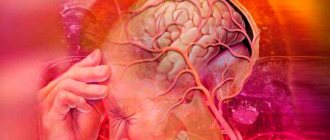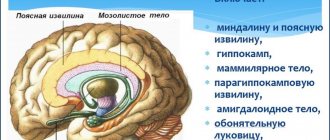The term apato-abulic syndrome is used to designate a fairly common mental disorder, the essence of which boils down to the patient’s loss of emotional revitalization, the development of persistent indifference to the outside world and a decrease in activity in general. It manifests itself as almost complete inactivity, rapidly developing sloppiness and a whole complex of additional accompanying symptoms.
By reading the information below, you will gain a complete understanding of the main features of a disorder such as apato-abulic syndrome, the causes of its occurrence, symptoms and signs, diagnostic procedures and treatment methods.
Risk factors
Abulia is a disease that is most typical for schizophrenics and people with unstable mental health. If the form of mental disorder is initial, then abulia will not be accompanied by hallucinations and delusions. But in rare cases, the development of parabulia is still possible when the patient experiences unnatural behavioral disorders, for example, exhibitionism or pedophilia.
Among the most common risk factors, experts identify:
- Post-stroke condition;
- Hypoxia;
- Severe intoxication;
- Parkinson's, Pick and Huttington's diseases;
- Malignant tumors;
- Bad habits.
Temporary manifestations of abulia usually occur as a psychogenic stupor or a reaction to serious mental trauma. Such attacks do not last long and pass immediately after the disturbing problem is resolved. In advanced cases, the condition can persist for several months or even years.
We say abulia, we mean lack of will
From the ancient Greek language, the term “abulia” means “lack of will.” In medicine, abulia is a condition in which a pathological lack of will manifests itself.
A person may experience constant bouts of laziness, he is overcome by a feeling of indecision, lack of will, and the desire to perform certain duties that require mandatory fulfillment may completely disappear.
This pathological disorder of the nervous system is a manifestation of apathy. It is not widespread, and the disorder itself is often confused with weakness of will. Abulia is easiest to identify in an adult patient; in children, this condition is usually accompanied by various associated problems.
What kind of disease is this?
Abulia is the name of a person’s mental state when apathy, indifference, and lack of will prevail in his feelings. Such conditions happen to every person from time to time. But in mentally healthy people, this feeling passes over time and is replaced by normal behavior. And with mental disorders, the patient experiences indifference to those things that previously evoked certain emotions in him and brought him satisfaction.
Abulia is a mental disorder of the nervous system from which it is impossible to get out on your own.
But not only these symptoms characterize apathetic-abulic syndrome. These include:
- absolute passivity;
- lack of interest in previously favorite activities;
- detachment from the real world;
- the person does not express any emotions.
Psychiatrists consider abulia to be a pathological condition associated with a decrease in the patient’s internal energy, with the fact that he does not have any aspirations or drives. When the patient begins to perform any actions, then at the very beginning mental modifications arise from the mere realization that something will need to be done.
Apatoabulic syndrome is associated with the lack of any desires, and this, in turn, causes great passivity and almost complete discord in the emotional sphere. In other words, abulia is a condition caused not by the fact that there is no opportunity to do something, but by the fact that there is no desire to do something.
It can be concluded that abulia is a mental illness accompanied by a lack of the individual’s will to perform actions or motivations, which occurs due to various reasons.
Clinical picture and symptoms
The key manifestation of the syndrome under study is such personal changes as emotional impoverishment and a significant decrease in vital activity. Pathological signs do not appear immediately. They are characterized by gradual and slow progression. Often, the patient and the people around him do not even pay much attention to these moments at first, and the first “alarm bell” sounds when the disease has progressed quite significantly.
It all begins, as a rule, with the patient’s loss of interest in any kind of activity and communication with other people. Old hobbies become indifferent, new ones do not appear. The patient does nothing, simply “killing time.” At first he goes to school/work, but he does it mainly for the reason that “it’s necessary.” Over time, attention to these activities completely ceases.
Psychotherapists and neurologists note that during abulia there often appears a pathological reluctance to show interest and effort in various, sometimes necessary actions or previously favorite activities, or there is a complete decrease in the energy level of volitional signs.
Other characteristic clinical symptoms of abulia:
- the patient looks sloppy and untidy;
- movements are slow, inhibited and uncoordinated;
- there are problems with speech and emotional manifestations, speech is often slow;
- the patient has a complete lack of desire to communicate with other people, friends, close relatives, they experience social isolation;
- speech becomes scarce, facial expressions disappear;
- there is a closed state, lack of activity;
- a person cannot make a decision on his own;
- loss of interest in all activities and entertainment that were previously favorite;
- Before answering the question posed, a person can think for a long time and remain silent.
In psychology, abulia first became known in the mid-19th century. Then the disease was known as a special change in a person’s behavior when he loses the desire and desire to do something. The patient is inhibited, pessimistic, withdrawn. The patient regularly feels tired, becomes sloppy and sloppy. In addition, scientists identify the following manifestations of pathology:
- Reluctance to interact with other people;
- Antisocial behavior;
- Failure to comply with daily hygiene rules;
- Impoverishment of vocabulary, gestures and facial expressions;
- Difficult unnatural movements;
- Indecision, refusal to make serious decisions;
- Thinking about the answer to a question for a long time;
- Memory impairment;
- Insomnia;
- Inactive lifestyle;
- Loss of interest in favorite hobbies.
Patients with abulia refuse even minimal exercise. And it is almost impossible to correct the situation, since any attempts to do this only cause aggression and resistance. But nevertheless, patients will never deny themselves delicious food and some entertainment, for example, listening to music and watching their favorite TV series. In advanced cases, a person may lock himself in his room and stop getting out of bed.
With apathetic-abulic syndrome, many emotional manifestations also disappear: sympathy, conscientiousness, care and the ability to love. To prevent the occurrence of such a condition, attention should be paid to even the most minor changes in human behavior. The main warning sign in this case may be the phrase “I don’t want,” which over time develops into “I can’t,” as well as an unkempt appearance: dirt under the nails, greasy hair, rumpled clothes.
Looking at a person with abulia from the outside, it seems that he is absolutely indifferent to others, to his own needs, and even to his favorite things. He is passive or completely motionless, inhibited, does not show any initiative, and there is almost no reaction to other people’s remarks.
Possible complications
Patients cannot cope with such a disease on their own and get out of the state of prostration, so they need constant care and reminders.
Without quality care and therapy, the following complications are possible:
- complete degradation of personality;
- the occurrence of skin diseases;
- intestinal inflammation;
- death.
Abulia is a serious pathology and requires full patient care.
Etiology and pathogenesis of the disorder
Typically, symptoms of abulia can manifest in people with weak mental health who are prone to various somatoform disorders.
Abulic syndrome can manifest itself during disorders in the blood circulation of the right hemisphere of the brain in the frontal part. This usually occurs due to traumatic head injuries or some serious brain disease.
The pathogenesis of abulia is associated with a decrease in dopaminergic neurotransmission in the frontal lobes of the brain. These lobes are responsible for the purposeful motor functioning of the body, the ability to manifest initiative processes, systematic activity, which is aimed at performing certain functions and overcoming difficulties.
Typically, patients with disorders of the frontal part of the brain experience a state of inertia and inactivity.
Most doctors and specialists note that the main factor that provokes the manifestation of abulia is stress.
The presence of abulia leads to the deprivation of the main factor of a person’s full existence - he ceases to be a person. This is due to the fact that this disorder contributes to the disappearance of a person’s motivation, which provokes him to perform functions to achieve his cherished goal.
Such pathological spinelessness is especially dangerous in childhood. Many parents may simply not notice the presence of this disorder in their child and mistake it for a character trait - laziness, apathy, weakness of will.
The most difficult is considered to be hereditary abulia, which occurs in children from the moment of birth. Many parents are happy when their child is very calm, quiet, and sits in one place for a long time, instead of running and playing. And this condition should cause concern in parents and be the first factor for conducting an appropriate examination.
Abulia often occurs in patients with schizophrenia. People with this pathological disorder often experience a deterioration in their mental state over time, a weakening of volitional impulses is observed, an increase in passivity occurs, and they often lack the desire to perform simple and necessary actions.
The short-term onset of abulia can manifest itself as a reaction to mental trauma. This condition may not last very long; it goes away after the situation that has a traumatic effect on the psyche is resolved.
During stupor with a depressive and apathetic character, as well as during catatonic stupor, the state of abulia can develop within 2-3 months, and can last for several years.
Who will win!?!
Since abulia is not an original disease, but is associated with the health of the brain, nervous system, and psyche as a whole, it must be addressed comprehensively. First you need to find a new passion, hobby, or even better, fall in love! In case of childhood abulia and head injuries, it is necessary to consult specialists (psychologists and psychotherapists). And older people need a little attention: a phone call or a visit will relieve the elderly from the blues. Drug treatment for abulia is necessary in severe cases.
Treatment and correction of apato-abulic syndrome
Treatment of apato-abulic syndrome is complex and includes several areas:
- Drug therapy - prescription of antipsychotics:
- frenolone – from 5 mg 2 times a day to 10 mg 3 times a day;
- triftazin - 5 mg 2-3 times a day in combination with 1 capsule of piracetam 2 times a day;
- penfluridol - 20-40 mg once every 5-7 days, also in combination with piracetam.
- Group psychotherapy: non-verbal methods with the gradual introduction of the patient into discussions, learning to adapt to everyday communication, returning communication skills. Mandatory practice of individual conversation to establish a trusting relationship with the patient.
- Family psychotherapy consists primarily of assessing relationships within the family and the role of each family member individually. One of the main tasks is the need to explain to the patient’s family all aspects of his condition and their manifestations. The need to resolve intra-family conflicts and establish harmonious relationships is also important.
Weakening of mental activity, passivity, and lack of initiative have always been noted in schizophrenia and are classified as negative symptoms, as emphasized earlier, more often designated by the imprecise concept of “defect.”
Apato-abulic syndrome in schizophrenia was described in the literature as “a drop in energy potential”, “dynamic emptiness or insufficiency”.
Psychiatrists have often noted that a person with schizophrenia can lie indifferently in bed for hours, showing no interest in any activity. “... This is some kind of dormant subject, completely indifferent to everything, apparently not thinking about anything and not caring about anything ... he is not interested in anything, does not do anything ... if you don’t force him to walk, he spends his whole day spends in bed” (Chizh V.P., 1911).
Stages
Abulia can occur either in a mild form, which is characterized by reduced motivation, or in a severe form, when it is even difficult for a person to get out of bed and put himself in order. Such volitional dysfunction is due to the fact that the patient cannot overcome himself and try to achieve the intended result. In this regard, experts highlight:
- Hypobulia – a sharp decrease in incentive motives;
- Hyperbulia – the main manifestation is hyperactivity;
- Parabulia – deviations in the patient’s behavior;
- Abulia – loss of desire for various actions.
The disease can be permanent, periodic or short-term. Thus, constant abulia usually develops due to the presence of schizophrenia in the patient or due to severe brain injuries. Periodic – common in alcoholics, drug addicts or people with manic tendencies.
Quite often, abulia can be combined with attacks of apathy - apato-abulia syndrome. Patients withdraw into themselves and do not need to communicate with other people, including relatives. Patients quit their jobs and stop engaging in their favorite hobbies. As another type of abulia, one can distinguish abulic-akinetic syndrome, which is characterized by inhibition of the thought process in a person.
Pathology can significantly reduce a person’s quality of life. It leads not only to personality degradation, but also to the loss of friends and family. In this case, a person loses his authority in society. That is why treatment of the disease should begin as early as possible, with qualified specialists helping to cope.
Forecast
If abulia is just beginning to gain momentum, then by following the tips described above, it is possible to achieve an improvement in the person’s condition in a fairly short time. But in most cases, the prognosis for patients with abulia is unfavorable. This is due to the fact that even with long-term therapy, it is impossible to achieve complete disappearance of all symptoms of the pathology.
As the main non-drug treatment, experts recommend resorting to psychotherapeutic techniques and cognitive behavioral therapy. Such activities are aimed at restoring the patient’s willpower and communication skills, which will ultimately help return the person to normal life.
Apatho-abulia syndrome is a combination of manifestations of apathy and abulia. Pathology rarely acts as an independent disorder. Most often, the syndrome accompanies various mental illnesses and organic brain lesions.
Combination of abulia with other syndromes
Forms of abulia can be mild and temporary, which are accompanied by minor deviations, reduced motivation, as well as more severe, up to complete suppression of will. In an extreme form of lack of will, there may be no desire to perform basic actions - get out of bed, wash, and so on.
Syndromes that accompany abulia:
- A syndrome of depressive and asthenic type, which is accompanied by elements of adynamia, neuroses, and psychopathic disorders. During this disorder, a short-term absence of volitional impulses and loss of activity occurs.
- Abulia of periodic type. This form often occurs in drug addicts, alcoholics, in patients with severe somatoform disorders, in patients with schizophrenia. Repeated periods of lack of will may occur, as well as psychoses of the manic-depressive type.
- Catatonic syndrome and stupor. This form is characteristic of schizophrenics, and also manifests itself in severe organic brain damage. In this condition, there is a constant lack of motivation and volitional impulses.
- Abulia can often be combined with mutism - a complete lack of desire to talk. Verbal contact with patients is disrupted, and it is impossible to get answers to questions from them.
- Apato-abulic syndrome. With this syndrome, emotional insufficiency and automaticity of movements occur. Patients experience complete withdrawal into themselves, they have a lack of desire to communicate, they show with their appearance complete indifference to the interlocutor, to close people, they have a complete loss of interest in their favorite activities and entertainment.
- Abulic-akinetic syndrome. With this disorder, there is a combination of lack of will with partial or complete immobility. This may often be accompanied by inhibition in the thinking process.
Diagnostics
Abulic syndrome is not a separate disease; therefore, it combines the symptoms of several mental disorders at the same time. It is also possible to notice the development of a deviation in everyday life, when, without any reason, a person’s behavior radically changes: he becomes lost, lacking initiative and tired.
To diagnose pathology in a medical institution, doctors usually use special tests and questionnaires and collect the patient’s medical history. For a more detailed study of a person’s condition, it is necessary to use instrumental methods: CT and MRI, electroencephalography of the brain, ultrasound, as well as laboratory tests of blood and urine.
It is important to differentiate abulia from manifestations of apathy and laziness, dementia and schizophrenia, and apatho-abulia syndrome from long-term depression and asthenia. In such cases, diagnosis is made by comparing various symptoms and criteria. For convenience, specialists draw up a table where they record the main characteristics of a person’s condition, starting from the patient’s complaints and his basic emotions, ending with relationships with people around him.
Difficulties in establishing a diagnosis may arise when abulia is suspected in children. Parents do not always notice the first signs of the disease in time, mistaking them for ordinary laziness. Such carelessness makes further treatment of the child difficult.
Prevention
To prevent the development of abulia, doctors advise paying attention to the person’s immediate social circle. At any age, everyone needs to feel needed and loved, because quite often malaise arises precisely because of a lack of attention and communication. Favorite hobbies play a particularly important role in the prevention of disease in adolescents.
To prevent the recurrence of the disease, it is necessary to monitor the patient’s condition and pay attention to any suspicious changes in his behavior. During exacerbations, the patient should not be left alone with himself. Psychotherapists recommend involving the sick person in work, focusing the person’s attention on the fact that he is needed and important.
Preventing the development of abulia
What is the prevention of apathetic-abulic syndrome? As you know, it can appear at any age.
Therefore, preventive measures are relevant in every age period:
- Elderly people need confidence in their relevance, need, and that they can be useful to their relatives. It is from such positions that the desire to do something, to provide assistance arises;
- For the younger generation and middle-aged people, interest in life will not disappear when they have activities to their liking and various hobbies.
Excessive care of relatives for the patient can only harm him. Often this consists of exclusion from participation in common events and joint work. Relatives try to predict and fulfill any desire. This imaginary concern will only provoke further progress of the disease. The tactics of relatives should be structured in such a way that the sick family member shows as active an active position in life as possible. And it doesn’t matter what it will be connected with - rest or work. This is the only way to get out of the mental state.











